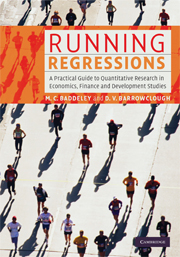 Running Regressions
Running Regressions Book contents
- Frontmatter
- Contents
- List of figures
- List of tables
- List of boxes
- Acknowledgements
- List of acronyms
- How to use this book
- Part I Simple regression and data analysis
- Part II Multiple regression and diagnostic testing
- 5 Multiple regression analysis
- 6 Heteroscedasticity
- 7 Autocorrelation
- 8 Model misspecification
- Part III Time-series econometrics
- Part IV Advanced topics
- Index
- References
7 - Autocorrelation
Tourism and the environment
Published online by Cambridge University Press: 05 June 2014
- Frontmatter
- Contents
- List of figures
- List of tables
- List of boxes
- Acknowledgements
- List of acronyms
- How to use this book
- Part I Simple regression and data analysis
- Part II Multiple regression and diagnostic testing
- 5 Multiple regression analysis
- 6 Heteroscedasticity
- 7 Autocorrelation
- 8 Model misspecification
- Part III Time-series econometrics
- Part IV Advanced topics
- Index
- References
Summary
Economic issues include:
Tragedy of the commons and environmental externalities
Game theory and the Prisoner's Dilemma
Tourism life-cycles and sustainable development
Econometric issues include:
Breusch–Godfrey LM and Durbin–Watson tests for autocorrelation
Generalised Least Squares (GLS) and the Cochrane–Orcutt procedure
Data issues include:
Measuring the environment
The issue
The tourism industry has great potential to boost incomes, growth and development in poorer countries. World Travel and Tourism Council (WTTC) estimates of the economic contribution made by tourism in 2005 include revenues of $6201.5 billion, employment of 221.6 million workers and an 8.3% share of GDP. For the Caribbean alone, a region heavily dependent on its tourism industry, 2005 estimates indicate that tourism has contributed 15% of GDP, 15% of jobs and $45.5 billion of revenue.
This growth in the tourism industry has not come without a cost. If tourism is not carefully planned then there will be negative consequences for the natural environment and for socio-economic and cultural institutions more generally. Even when judged in terms of prospects for the tourism industry alone, if the environmental resources on which tourism depends are exploited and destroyed by rapid growth in tourism demand then the contribution of tourism to sustainable development in the long term will be limited. In managing a tourism industry that will be sustainable in the future, policy makers need to take account of the environmental consequences.
- Type
- Chapter
- Information
- Running RegressionsA Practical Guide to Quantitative Research in Economics, Finance and Development Studies, pp. 157 - 177Publisher: Cambridge University PressPrint publication year: 2009


